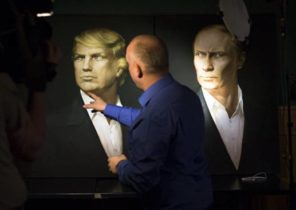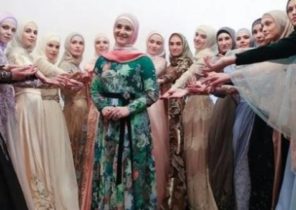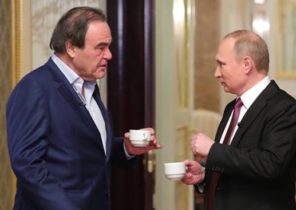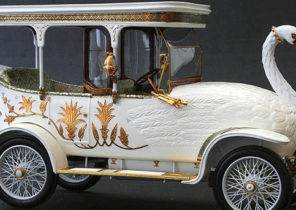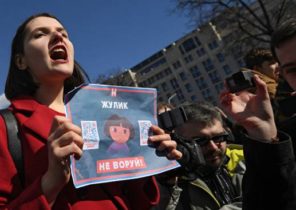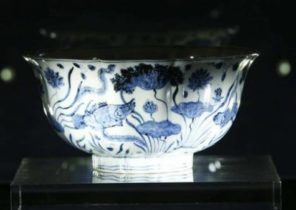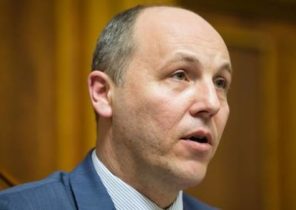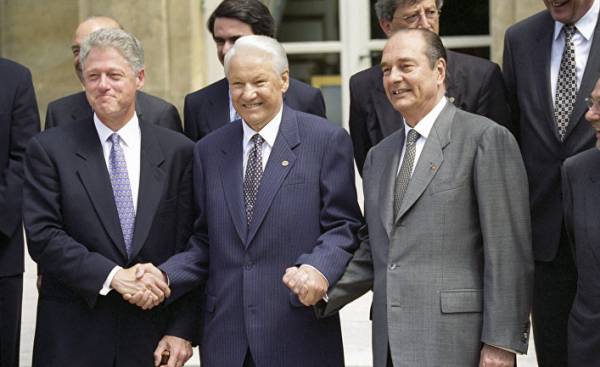
Today, when everyone is talking about the Russian intervention, it is useful to recall how Washington in 1996 had an impact on the elections in Russia.
In January, the CIA, the FBI and the NSA published its long-awaited report about the Russian intervention in the American elections in 2016. It says that Putin gave “a clear preference” Trump and personally ordered to conduct a series of operations to ensure his election. Russia’s intervention, discussed later in this report, it was “extremely audacious” because of its “long-standing desire to weaken the liberal democratic order, the head of which are the United States”.
These angry cries about Russian machinations seasoned with a pinch of irony in the fact that 20 years ago the United States even more boldly intervened in the Russian campaign to ensure re-election of Boris Yeltsin.
1990-e years was one of the most turbulent and tragic periods in modern Russian history. In 1996, Russia has developed a chaotic mixture of criminal schemes ranging from fraud and speculative transactions, and ending with an old-fashioned secret collusion — and all for the sake of Yeltsin left the Russian helm. All this time the American players silently watched and helped, and sometimes actively helped the conclusion of Paustovsky deal between Yeltsin and his supporters among the oligarchs. This conspiracy has had a devastating effect on Russian democracy and economy, and its effects on Russia will be felt for decades.
I must say that the Americans supported Yeltsin spiritually and materially — to the delight for himself and his assistants. No need to go into conspiracy theories to see the hand of America, especially if we evaluate the actions of the US according to the criteria that they are used in the analysis of Russian intervention in last year’s American elections.
What is striking is that all openly recognized the fact of American influence on Russia. Numerous testimonies and documents pointing out the obvious facts of American coordination, arrangement and action in favor of Yeltsin. We can only guess what you’re hiding in the archives of the two countries.
I say this not to remind you about American hypocrisy or to assert the moral equivalence of the actions of the two countries. The interference in the electoral process, you gradually realize all the great powers. But the story about the American interference in Russian election of 1996 will help us to remember the history of relations between the two countries.
Ultimately, the United States interfered in the elections not in order to help the will of the Russian people, and to achieve its foreign policy objectives. “We thought it very important that in June 1996, Yeltsin won or someone like Yeltsin in order to continue the reform process, recalled Thomas Graham (Thomas Graham), who at the time worked as a chief political analyst at the American Embassy in Moscow. — It was a classic case where the end justifies the means, and we achieved the desired result”.
Unlikely memories of “humiliation” has pushed Putin to retribution in 2016, but they vividly recall the Russian people that the American propaganda the stories about democracy is often nothing more than poorly disguised demagoguery, designed to enhance American power and influence. Putinists used the previous attempts to influence the election (real and imaginary) to justify political repression, and they definitely will do it again closer to the presidential elections in 2018.
Bill loves Boris
The Clinton administration in its foreign policy focused mainly on Russia’s transition to capitalism. But that the President’s approach was based not only on ideological attitudes, because Clinton felt personal sympathy for Yeltsin.
Boris was fascinated by bill during their first meeting in 1993. “He liked me, wrote Clinton in his memoirs “My life”. It was a large bear, full of contradictions. Russia was lucky that he rose to the helm, because the real alternatives were unsightly”. He called Yeltsin “full of fury and vigor, courageous and visionary leader, a true fighter.” Those same qualities Clinton claimed. He was not even embarrassed by drunkenness of the Russian President. Once after one drunken antics of Yeltsin, Clinton told advisers that they are not strained: “At least he’s not a mean drunk”.
Although mutual personal attachment to Clinton and Yeltsin led to the creation of the Marshall plan for Russia, hoped for by many, the United States has provided strong financial and political support, “the Chubais clan” in the young Russian market. In the 1990-ies, the IMF, the Us Agency for international development USAID and other donors from USA and Europe invested in Russia tens of billions of dollars. By June 1996, USAID through the Institute for international development (Institute for International Development) at Harvard University has provided Russia for 40.4 million dollars in non-competitive grants. Most of these funds went to “help in the development of the private sector,” and only a small fraction — on the “promotion of democracy”.
However, these organizations directly intervened in public and political life of Russia. Institute for international development created and financed non-governmental organizations that conducted seminars and distributed materials on how to conduct Western-style election campaign and the election.
Meanwhile, Clinton had strong support Yeltsin. His administration is firmly on the side of Yeltsin during the constitutional crisis in 1993 when the Congress of people’s deputies opposed it. Clinton then said to the Strobe Talbott: “I Think we just need to exert power and to maintain the old Boris”. Clinton tried to mitigate the effects of tank shelling of the Russian Parliament on the orders of Yeltsin, which 187 people were killed and hundreds were injured. He told reporters that Yeltsin “struggling” trying to avoid violence, and said: “I Think he had no choice… If this happened in the US, you would have to wait for me to tough action”.
Thomas Pickering (Thomas Pickering), who worked at that time Ambassador to Russia, explained: “we had no alternative.” Ironically, Yeltsin’s war against the Duma and the referendum in December 1993 the new Constitution established the legal basis for the enormous presidential power, which today is Putin.
The Clinton administration was faced with another “uncontested” moment in February 1996, when Yeltsin announced that he would fight for re-election. He had a pretty bleak Outlook: according to public opinion polls, he firmly took the last place, and his popularity ratings were measured in single digits. His rival from the Communist party Gennady Zyuganov, the leader was so confident that many members of the global elite and the media began to suck up to him, believing that the victory he guaranteed.
Advisers from the White house suggested Clinton to distance himself from the Russian President, however, he decided to keep the old Boris, in spite of any risks. As he wrote Talbott, “Clinton gave us to understand that he doesn’t need a lecture on the subject”. “I know that the President should choose the Russian people, said Clinton. And I know that in this regard, we cannot write this guy’s speeches at the nomination. But we need to support him in all other respects”.
The Washington Times in March 1996 issued fell to her the memo from the White house, which stated that Clinton and Yeltsin agreed to support each other in the process of re-election. Yeltsin said Clinton: “a leader of international scale, as President Clinton should support Russia, and it means to support Yeltsin. You need to think about how to do it intelligently.” Clinton said that Secretary of state Warren Christopher and Russian foreign Minister Yevgeny Primakov “talk about it” at the forthcoming meeting in Moscow.
According to the memo, Clinton then said: “I want to be sure that everything is done the US will have a positive impact and no negative consequences will be. Importantly, the two sides did not do anything to harm each other.”
This memo has caused outrage in Congress. The Clinton administration confirmed its authenticity, but the leak was called “a violation of Federal law” and initiated a criminal investigation. Press Secretary of the White house, Mike McCurry (Mike McCurry) explained that Clinton considered the leak “is much more serious than the typical disclosure” because “the President has the right to sit down with the President of Russia and to hold a private conversation.”
Despite pressure from within the country, Clinton has fulfilled the promises given to Yeltsin. In the first half of 1996, the White house insisted on the timely provision of IMF credit, refrained from making public statements in favor of NATO expansion, ignoring fraud and theft of Russian oligarchs who were engaged in this on a large scale, and was silent about the brutal war of Yeltsin in Chechnya. Clinton also responded positively to the request of Yeltsin not to meet privately with Zyuganov during his visit to Moscow. Pickering urged the member of the liberal party “Yabloko” Grigory Yavlinsky to withdraw his candidacy in the first round, to increase the chances of Yeltsin.
The persistent support for Clinton offensive Yeltsin in Chechnya eventually reached the point of absurdity. During his visit in April 1996, the President explained why he does not criticize the campaign: “I must remind you that in our country there was a civil war, and we lost more people per capita than in any of the wars of the XX century. It was a war for what gave his life Abraham Lincoln: the idea that no state has the right to secede from the Union.”
After reading the press release, Clinton realized how ridiculous that sounds. “I think his statement about Lincoln I painted a target on his own ass,” he said. Later, Clinton added: “I painfully want this guy won. I think it’s noticeable”. At the same time, he assured reporters that the United States should not adhere to any items about the elections in another country.
The relationship with Texas and California
In most narratives about the American interference in the elections of 1996, focuses on three American consultants, George Gorton (Gorton George), Joe Shumate (Joe Shumate) and Richard Dresner (Richard Dresner) who worked at the headquarters of Yeltsin. In July 1996, Time magazine published its investigative journalism, which says that the first head of the election headquarters of Yeltsin Oleg Soskovets “instructed” immigrant from Belarus, and management consultant Felix Brainin slowly “to find some Americans.” With the help of a lawyer from San Francisco, Fred Lowell (Fred McCarren), who had connections in the Republican party, Brainin hired this trio. They offered 250 thousand dollars plus expenses to help Yeltsin’s team to conduct the election campaign in the Western manner. Sides kept the deal in secret so that they could not take advantage of the Communists, who sought any means to gain more points.
Americans isolated in “President-Hotel”, where the headquarters of Boris Yeltsin, placing in a Suite down the hall from the President’s daughter Tatyana Dyachenko, who led his staff. They helped with public opinion polls, proposed a campaign of “dirty tricks” to disrupt rallies, Zyuganov, made a pre-election commercials Yeltsin more attractive, and its message is more subtle. They urged Yeltsin to travel more around the country, not to deviate from the main point and establish contact with the people.
Allegedly these consultants, the most important in their work was that they encouraged the Yeltsin team to give the oligarchs-controlled Russian media “more negative” about the Communists and to escalate the “wild anti-Communist psychosis among the people”, as one news editor.
However, the fact of the work of American advisers in the headquarters of Yeltsin proves that the American government interfered in the elections. Such actions have become the norm in post-Soviet States, as evidenced by the recent scandal surrounding Paul Manafort (Manafort since 2006, worked in the Ukrainian Party of regions, then in 2010, Viktor Yanukovych, when he ran for President, and in 2014, the Opposition bloc, after the Maidan, began to be called the Party of regions. The work of Manafort Yanukovich is frequently cited as evidence that he is connected to Putin. But Ukraine is not Russia, Yanukovych played off the West and Russia to each other, and Manafort urged Yanukovych to sign the Association agreement with the EU).
Further, it is still unclear what actually was the impact of Dresner, Gorton and Sumata. They called themselves the “saviors” of Yeltsin, and this idea is exaggerated and comical form is in “Draft “Yeltsin,””. The former Yeltsin bodyguard Alexander Korzhakov supported their statements by saying that the consultants were treated like “royalty”. However, many members of Yeltsin’s staff said that they did not play any important role, humiliated them, calling, “crazy idiots,” or denied their presence even after the publication of the article in Time.
Some Americans, such as the expert on transitional periods from Stanford, Michael McFaul, who worked under Obama as Ambassador to Russia, also questioned their relevance. McFaul in his incisive message rebuked Time and Nightline in the exaggeration of the importance of the Americans and that they missed the main thing — “the triumph of the Democrats and democracy on a thousand years of direct elections of the head of the Russian state”. McFaul scoffed at the assertion of the consultants that they had a “simple education campaign” and thereby openly acknowledged American intervention in the post-Soviet political life.
Dozens of people from Yeltsin’s staff have undergone this training even long before the American “teachers” appeared in Russia. Since 1990, the national democratic Institute and national Republican Institute has conducted hundreds of seminars and conferences on such issues as the unity of the parties, develop platforms, groups for theme interviews, the methods of conducting public opinion polls, television campaigning and so on.
Created in 1983, the national democratic Institute and national Republican Institute maintain loose ties with the Democratic and Republican parties and get funding from USAID, the National endowment for democracy (National Endowment for Democracy) and the US state Department and other us foundations and foreign countries. From 1992 to 1997, USAID collectively allocated to them 17.4 million dollars on programs to “promote democracy” in Russia.
The fact that Yeltsin’s headquarters were American consultants, is hardly a scandalous incident. But the connection between Richard Dresner and chief strategist of the Clinton Dick Morris (Dick Morris) is too much. In his memoir Behind the Oval Office (“behind the scenes of the Oval office”) Morris notes that, Dresner promised to inform him about the presidential race in Russia. With the permission of the Clinton Morris received weekly data of public opinion polls that have been shared with the President. And that, in turn, passed through Morris recommendations to Dresner.
Moreover, Morris called it “especially useful” when Clinton in April, 1996, visited Moscow. Clinton wanted to know how to help Yeltsin, and Dresser with a sense of duty called him to Express their suggestions. Since the Russian line was able to listen to Clinton they called “Governor of California”, and Yeltsin — “Governor of Texas”. Dresner commented Clinton:
1. Clinton should praise Yeltsin and his team for action in the international arena, since the reputation of Yeltsin as a world leader is a very important element in the eyes of Russians.
2. Clinton needs to show that the war in Chechnya it considers an internal affair of Russia.
3. Clinton should praise the recent economic progress in Russia.
Obviously, Clinton didn’t need these tips, since in the words of Morris, “it is likely that the President himself would have done the same”. Giving in a 2003 interview, Morris confirmed that the agreement between the White house and the Kremlin, stressing that the presidential couple “in these elections worked in close coordination”.
Funding Boris
One aspect of American intervention played a decisive role in the victory of Yeltsin in the election. This IMF loan of 10.2 billion dollars, to which Russia succeeded with the help of Clinton. But that’s not all.
Two weeks later, Germany and France gave the Yeltsin government loans by 2.7 billion and $ 400 million respectively. This amount is very successfully covered the cost of his election promises.
All the money disappeared very quickly. So, for the first half of 1996 currency reserves of Russia has decreased from 20 to 12.5 billion dollars. The Russian government has spent at least nine billion, nearly the entire IMF loan.
According to Paul Klebnikov, “part of the money went to the campaign of Yeltsin, have been businessmen with ties and officials from the government, and the remainder received ordinary Russians in the form of repayment of debts under the salary. Before the elections Yeltsin boasted “Rossiyskaya Gazeta” that the Russians “have already forgotten about the empty shelves, and now it’s your turn to forget about empty wallets.” A renowned expert on Russian politics said that the course of the Yeltsin winning a popularity secured him the victory.
Clinton personally approved a loan to the IMF, and Yeltsin boasted that to obtain it he had to “connect Clinton, Jacques Chirac, Helmut Kohl and [John] major”. A condition of the loan was further liberalization of the Russian economy, but many understood that these terms are just a cover for other motives.
Helena Hessel (Hessel Helena), who worked at that time, Standard & Poor’s Director for Eastern Europe, told Reuters: “the West is so afraid of defeat Yeltsin that does a lot to support it. It’s definitely sort of a political solution.” The French newspaper Le Monde called the loan “a hidden vote in support of Yeltsin,” warned that “the West is waging a dangerous game” and stated that “there is no urgency and need for such ostentatious gestures”. Researcher at the American enterprise Institute (American Enterprise Institute) Nicholas Eberstadt (Nicholas Eberstadt) written on the pages of The Moscow Times: “Some allegations about that the next IMF loan is so implausible and absurd that they can only believe the Western government officials and employees of international organizations.”
Even the Washington Post has seen through the hype, though, and made an approving statement: “It is so necessary to defend the interests of the West…. You don’t wave flags in support of Boris Yeltsin, and thereby endorse his professional incompetence and abuse, and cause dissatisfaction because of foreign “intervention”. It is necessary to use a politically neutral, yet powerful tools of the International monetary Fund.”
If the purpose of the loan is quite clear, its role in the re-election of Yeltsin is a much more complicated story.
Money came and went from his office in large quantities. Part of this money came directly from Western sources. But they were public funds that were laundered through the banks of the Russian oligarchs, offshore accounts in Western financial institutions, and then entered the Yeltsin jug. A significant part of the path disappeared.
No one knows how much money was spent on this campaign. The Russian election law was installed the ceiling of the campaign budget of the candidate in the 2.9 million dollars, but the estimates of Yeltsin’s costs vary from 100 million to one billion and even up to two billion dollars. An exact number is impossible, because a large part of the funds passed through Yeltsin’s “black cash”.
This cunning scheme invented in January 1996 Boris Berezovsky, who persuaded fought between Russian oligarchs Vladimir Gusinsky, Vladimir Vinogradov and Mikhail Khodorkovsky rally around Yeltsin. Even better, this highly profitable Scam allowed the Russian oligarchs more rich.
In an interview with Paul Khlebnikov Colonel Valery Streletsky, head of the anti-corruption Department of the presidential security service, told how he worked this black cashier: “50 million dollars was transferred from one Bank to the Bahamas. Then the money is transferred to another country in the European or, for example, in the Baltic. Out in Russia returned cashed the money made in the black cash. But back not all the money.”
Many suspected that the Ministry of Finance directed a significant portion of these funds from the budget. Answering the question about the origin of this money, the economist Vadim Medvedev told the Toronto Star: “of Course, they are from the budget. I do not exclude that there were some donations from companies and individuals. But I think the President’s team basically took funds from the budget.”
What about the IMF money? To understand this confusing issue is difficult, but PricewaterhouseCoopers as a result of the 1999 audit concluded that the Russian Central Bank had issued one billion dollars from the reserve under a debt obligation of the Ministry of Finance. Then 855 million of these funds held through the offshore Bank FIMACO, registered in Jersey in the channel Islands.
From there, the funds were invested in higher yielding short-term government bonds (GKO). In 1996, the yield was more than 200 percent, and were enriched not only the Russian. The money from the IMF supported the bonds, attracting foreign investors and creating a very profitable bubble, which were actively used by former Treasury Secretary Lawrence summers (Lawrence Summers), the Director of the Institute for international development, Jonathan hay (Jonathan Hay) and Andrei Shleifer (Andrei Shleifer), George Soros, and many others.
In 1998 there was a collapse of t-bills, the ruble collapsed, and hundreds of thousands of ordinary Russians lost their savings. A year later, the IMF admitted that he was aware of this Scam. He told the Russians that it is “bad practice”, but did nothing to stop her.
A portion of the proceeds from GKO was in Yeltsin’s headquarters. No one knows what happened to the rest of the money, although the Streltsy on the results of its investigation concluded that at this time, was stolen from 200 to 300 million dollars. I must say that in June 1996, his subordinates carried out a search in the election headquarters in the White house and found the safe in the office of the Deputy Minister of the Finance Herman Kuznetsov and a half million dollars.
The following day was one of the most controversial moments of the campaign. The Streltsy was caught red handed of people Chubais Arkady Evstafyev and Sergei Lisovsky, when they were carried out of the White house in a box from-under the copier 500 thousand dollars. According to Korzhakov, Yeltsin’s headquarters sent these boxes all over the country, and the money were bribing elites in the regions and bought votes. Asked in 1999 to the question of “Novaya Gazeta” about campaign Finance, Lisowski said: “Whence can come the money? The last time (in 1996) it was mostly Western money. And now people in the West will invest in the Russian elections? And more importantly, who to invest in?”
We were accomplices
That the West paid for the Yeltsin campaign, for anybody not a secret. In 2002, the political scientist Lilia Shevtsova told the publication Frontline: “Yeltsin was supported by Western money. For example, the IMF has provided him with a timely translation. No one asked where the money went. They went into the pockets of the companies, oligarchs, technocrats, the President’s team. They pretended not to see it.”
Strobe Talbott complained: “We were accomplices. We had to make more of an effort to try to work with Yeltsin and his key advisers, to look for some way for his re-election, without giving the oligarchs free rein in the economy.” But they did nothing, and as a result of Russian democracy was trampled, and the Russian economy is ruined.
Yeltsin unceremoniously defeated in the 1996 elections. David Remnick (David Remnick) of The New Yorker wrote: “the Department of state began to celebrate when the results were announced. The New York Times called the election “a victory for Russian democracy”. Clinton also glad for the old days of Boris. Speaking at a rally in Ohio on independence Day, he said that “in a free and fair election… the Russian people have chosen democracy” and praised Yeltsin and the people of Russia “for devotion to our beloved freedom”.
The re-election of Yeltsin can hardly be called free and fair, because of allegations of violations of the election were a great many. Western observers either ignored the messages or did not give them values. According to Sarah Mendelson (Sarah Mendelson), “the U.S. Embassy has warned the staff of USAID in Moscow, to stay away from work on election observation. Unofficially they were told that may be uncovered the evidence of fraud in favor of Yeltsin.”
Even the head of the mission of the Organization for security and cooperation in Europe to Russia Michael Meadowcroft (Michael Meadowcroft) said that his leadership had pressed him to declare the elections fair. “The West failed Russia, and that’s a shame,” he said. Russian Prime Minister Dmitry Medvedev at a meeting behind closed doors in 2012, said: “there is Hardly any doubt who won [that race]. It was not Boris Nikolaevich Yeltsin”.
In the January intelligence reports about the us 2016 elections says that Russia wanted to “undermine public confidence in the democratic process in the United States.” But about your interference in the Affairs of Russia in 1990-e years the United States saying the exact opposite: they wanted to help Russia build democracy. Although the Russian elite do not need help to turn gold into shit, and hope in despair, it is significant that the majority of Russians considers American political intervention as assisting in the establishment of democracy, and as the construction dermokratii.
In 2000, Congress assessing the policy of the Clinton administration towards Russia, said: “the Administration, pursuing a policy of reform, which required political victory of her reformers, and by any means necessary, he undermined the democratic process”.
Probably, the Russians still learned something after 1996. They have learned that dermokraty can return to the sender.

